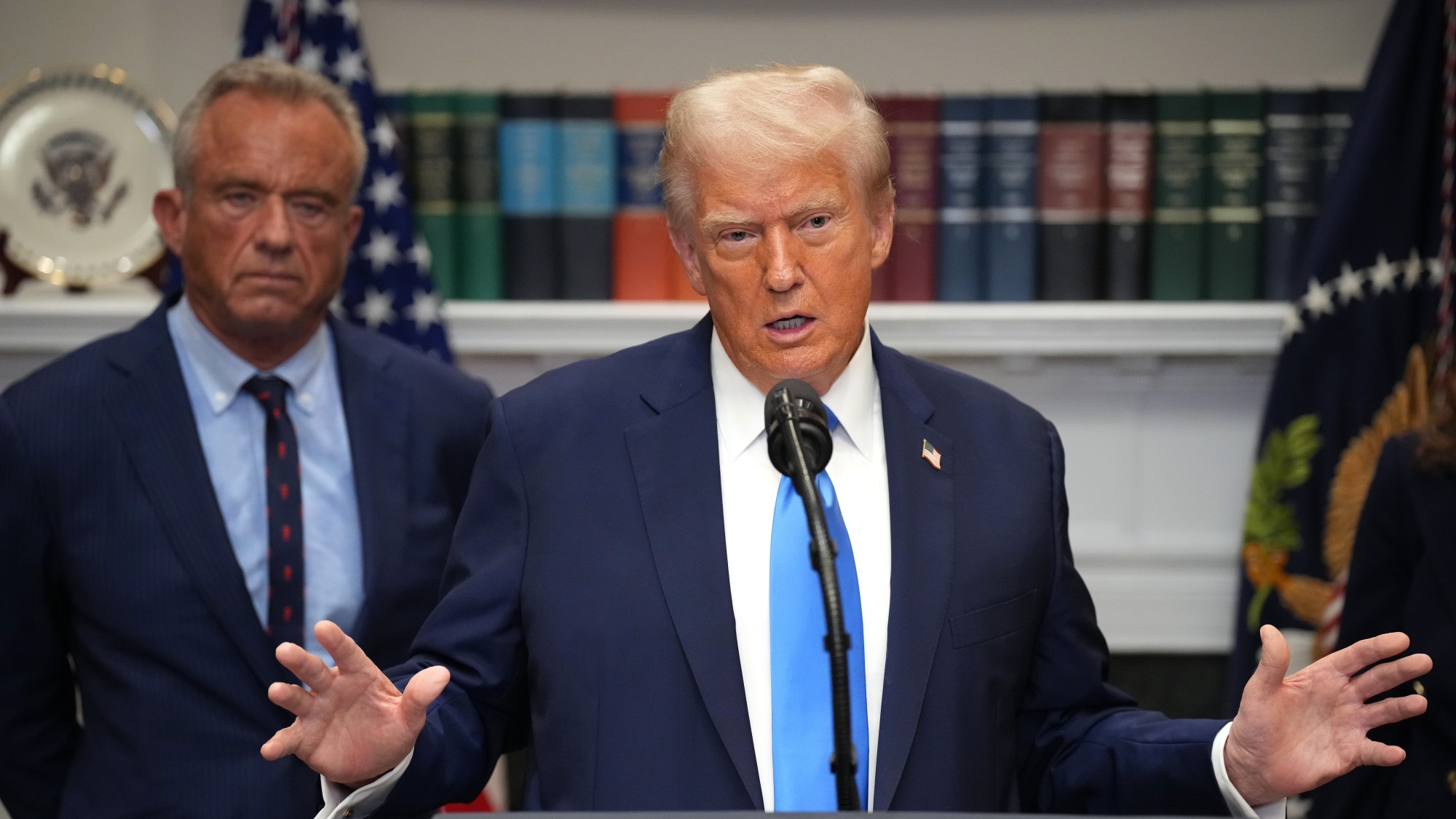By The Week UK
Copyright theweek

SUBSCRIBE & SAVE
Less than $3 per week
View Profile
The Explainer
Talking Points
The Week Recommends
Newsletters
From the Magazine
The Week Junior
Food & Drink
Personal Finance
All Categories
Newsletter sign up
the explainer
Why are autism rates increasing?
Medical experts condemn Trump administration’s claim that paracetamol during pregnancy is linked to rising rates of neurodevelopmental disorder in US and UK
Newsletter sign up
Donald Trump announced that federal health officials suggested a link between the use of paracetamol during pregnancy as a risk for autism
(Image credit: Andrew Harnik / Getty Images)
The Week UK
24 September 2025
The UK health secretary, Wes Streeting, has told Brits to ignore what Donald Trump says about medicine after the US president claimed a link between taking paracetamol and autism.
Speaking at the White House this week, flanked by his own vaccine-sceptic health and human services secretary Robert F. Kennedy Jr, Trump said use of the painkiller Tylenol – an American brand of paracetamol – by pregnant women led to a higher risk of autism in their children.
“I trust doctors over President Trump,” Streeting told ITV’s Lorraine programme, and the claims have been widely condemned and countered by medical experts around the world, amid ongoing debate about rising rates of the neurodevelopmental disorder in the US, UK and elsewhere.
Escape your echo chamber. Get the facts behind the news, plus analysis from multiple perspectives.
SUBSCRIBE & SAVE
Sign up for The Week’s Free Newsletters
From our morning news briefing to a weekly Good News Newsletter, get the best of The Week delivered directly to your inbox.
From our morning news briefing to a weekly Good News Newsletter, get the best of The Week delivered directly to your inbox.
Does paracetamol cause autism?
The connection between paracetamol use and autism “has not come out of the blue”, said The Times: a “potential association between paracetamol exposure in the womb and autism had been identified in small, observational studies over the past 10 years”.
But “larger and more rigorous studies have disproved a causal link and reputable scientists are confident” the popular painkiller does not increase the risk of autism, attention deficit hyperactivity disorder (ADHD) or learning disabilities.
The largest of these studies, and the one cited by Streeting to directly dismiss Trump’s claims, was published last year and looked at 2.5 million children born in Sweden between 1995 and 2019. By comparing rates of autism between siblings where only one had been exposed to paracetamol in the womb, scientists concluded paracetamol use “was not associated with children’s risk of autism” and that previous links were likely the result of unrelated underlying factors.
Medical bodies and regulators in the US, UK and Australia have been quick to rally behind the scientific evidence, with Steven Fleischman, president of the American College of Obstetricians and Gynecologists, calling Trump’s comments “highly concerning to clinicians but also irresponsible”.
Sign up for Today’s Best Articles in your inbox
A free daily email with the biggest news stories of the day – and the best features from TheWeek.com
Contact me with news and offers from other Future brandsReceive email from us on behalf of our trusted partners or sponsorsBy submitting your information you agree to the Terms & Conditions and Privacy Policy and are aged 16 or over.
What other debunked theories have circulated?
Trump has announced a wide-ranging effort to study the causes of autism including “long-debunked claims that ingredients in vaccines or timing shots close together could contribute to rising rates of autism in the US”, reported The Telegraph.
“Without evidence”, the president claimed “that hepatitis B vaccines should not be given until children are 12 years old, and that the measles, mumps and rubella (MMR) jab should be taken ‘separately’”.
Numerous studies on hundreds of thousands of children have consistently found no link between vaccinations and autism.
This has not stopped Kennedy, who has repeatedly said the US is in the grip of an “autism epidemic” fuelled by “environmental toxins”, from singling out the Amish community – whose use of prescription drugs and rates of autism are well below average – as proof of his unsubstantiated theories.
What’s really behind the rise in numbers?
It is true that autism is being diagnosed at higher rates among children in many richer countries over recent decades, but experts say it is likely due to increased awareness, testing and the broadening definition of the neurological disorder.
Over the past 25 years autism prevalence in the US has increased from one in 150 to one in 31, according to a report on the US Centers for Disease Control and Prevention website. The trend has also been observed in other high-income countries, including the UK, Denmark, South Korea and Japan but there are “several reasons” to think this is linked to a “rise in diagnoses”, said Nature.
Since 1980, when it was first recognised as a separate mental health condition in the Diagnostic and Statistical Manual of Mental Disorders (DSM), “the diagnostic criteria for autism have broadened”, said BBC Future. Another “big shift” occurred in 2013 when “the DSM brought subcategories including Asperger’s syndrome under the umbrella of autism spectrum disorder”, meaning “people who wouldn’t previously have received an autism diagnosis now are more likely to meet the criteria”.
Diagnostic disparities have also “narrowed in groups that were historically overlooked” while the “gradual lessening of stigma is also thought to have led to more autism evaluation in children and adults”, as has a greater awareness of autism’s “many manifestations” among both members of the public and health professionals.
“More than anything”, said Nature, “research has shown that the drivers of autism are fiendishly complicated”.
“There will never be a sound-bite answer to what causes autism,” said Helen Tager-Flusberg, a psychologist who studies neurodevelopmental conditions at Boston University, Massachusetts.
Explore More
Donald Trump
The Week UK
Social Links Navigation
Would Woody Allen’s first novel be better as a film?
Talking Point
The 89-year-old’s ‘wince-inducing’ new book follows a neurotic writer accused of sexual harassment
Comedians to see on tour this fall
the week recommends
Laugh to keep yourself from crying
Crossword: September 24, 2025
The Week’s daily crossword
You might also like
Trump makes unmoored claims on Tylenol and autism
No causal relationship has been established between autism and acetaminophen use during pregnancy
RFK Jr. vaccine panel advises restricting MMRV shot
The committee voted to restrict access to a childhood vaccine against chickenpox
Why social media is obsessed with cortisol
In The Spotlight
Wellness trend is the latest response to an increasingly maligned hormone
Scientists are speeding up evolution
Under the radar
Proteins can evolve in minutes
Texas declares end to measles outbreak
The vaccine-preventable disease is still spreading in neighboring states, Mexico and Canada
How China is battling the chikungunya virus
Under The Radar
Thousands of cases of the debilitating disease have been found in the country
RFK Jr. shuts down mRNA vaccine funding at agency
The decision canceled or modified 22 projects, primarily for work on vaccines and therapeutics for respiratory viruses
Forever chemicals were found in reusable menstrual products. That is nothing new for women.
Under the Radar
Toxic chemicals are all too common in such products
View More ▸
Contact Future’s experts
Terms and Conditions
Privacy Policy
Cookie Policy
Advertise With Us
The Week is part of Future US Inc, an international media group and leading digital publisher. Visit our corporate site.
Future US, Inc. Full 7th Floor, 130 West 42nd Street



